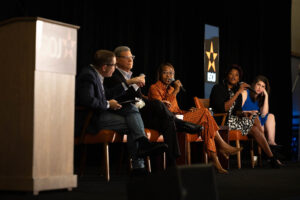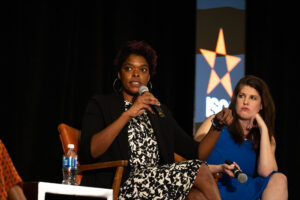April 14, 2024 | Accountability, Elections, ISOJ2024, Trust
Journalists engage in lively panel discussion at 25th ISOJ about media coverage of U.S. elections
Lee este artículo en español abajo
Journalists indulged in a vibrant, and occasionally profane, discussion of media coverage of U.S. election cycles and the upcoming presidential election during an April 13 panel at the 25th ISOJ centered around the question, “The media and election season: Are we gonna get it right this time?”
The panel, which featured four top-notch journalists, was moderated by Evan Smith, co-founder of The Texas Tribune and a senior advisor at the Emerson Collective. Panelists examined the media’s coverage of the 2016 and 2020 presidential elections, as well as best practices for the 2024 election.

Shawna Thomas, an executive producer for CBS News’ CBS Mornings, said the media didn’t take Donald Trump seriously when he first ran for president in 2016. She said most people knew Trump from his role in “The Apprentice” and appearances in the New York Post — in other words, as a celebrity.
“I do not think we totally understood who Donald Trump was,” Thomas said. “We were learning as the voting base was learning, too, that we didn’t understand the power of what he was doing.”
It was only after Trump was elected president that journalists began taking him seriously, Thomas said. She said that while she doesn’t believe journalists have anything to apologize for, they should — and did — learn from that experience.
“We were not listening to the people and the public in the same way that I think we are better at now,” Thomas said. “And I’m saying we as a collective we, maybe I’m just really talking about myself.”
Charlie Sykes, a contributor and columnist at MSNBC, said there’s been a “general failure of journalism” in covering presidential elections.
“Answering your question, ‘Are we gonna get it right this time?’, you’re not going to like this, but the answer is no,” Sykes said. “I think there’s a real possibility that we’ll be even worse this time.”
Since 2016, the media has been “broken and shattered,” Sykes said. He noted the destruction of print media, the fragmentation of other forms of media and worsening climates for misinformation on social media platforms like X/Twitter.
“Even though there’s a sentiment (that) yes, we’ve learned a lesson, the reality is that the model has been broken so badly,” Sykes said.
Sykes described the 2024 election as an “81-year-old guy running against somebody with 91 felony charges.”
“Yet there is a tendency of many journalists to mute the crazy,” Sykes said. “There’s a danger of succumbing to the banality of crazy, of being sucked into the horse race, of treating it as a show rather than of substance.”
Sykes said that although there’ll be “some of the best journalism of our lives this year,” the voters that most need that journalism will not see it or will not believe it. He said this mainly comes down to the isolation of journalism and lack of trust in the media.
“The age of mass media is over,” Sykes said. “We’re talking about a completely different media universe and too many journalists continue to act as if it’s still 1976.”
Abby Livingston, a senior congressional reporter at Puck, said she went to college at UT during the second Iraq War. It was during this time that she said she realized the failure of the press corps, which drove her desire to do better.
“We fast forward to election night 2016: It never crossed my mind based on everything I’d ever learned about American politics that Donald Trump would become president until 10 o’clock on election night,” Livingston said.

Livingston said Trump’s victory blew apart everything she’d learned about how campaigns, polling and fundraising worked. She said she believes journalists should be less focused on polling and predicting election results.
“We try to make it algebra and at the end of the day people go into a voting booth and they do weird things,” Livingston said.
Errin Haines, editor at large at The 19th, said many Black journalists realized that Trump would likely win the 2016 election, but weren’t listened to.
She said journalists must be prepared to cover what happens on election day, but also what will happen after the election — which journalists weren’t prepared enough for in 2020.
“Do we have anything to solve for? Absolutely,” Haines said. “And are we gonna get this right? We fucking better.”
ISOJ is a global online journalism conference organized by the Knight Center for Journalism in the Americas at the University of Texas at Austin. In 2024, it is celebrating 25 years of bringing together journalists, media executives and scholars to discuss the impact of the digital revolution on journalism.
* Naina Srivastava is a first-year journalism student at UT Austin. She is currently a senior news reporter and senior photographer for the Daily Texan, and an intern at the Austin Chronicle.
Periodistas participan en una animada mesa redonda en la 25ª ISOJ sobre la cobertura mediática de las elecciones estadounidenses
Un grupo de periodistas participaron en un animado debate, en ocasiones profano, sobre la cobertura mediática de los ciclos electorales estadounidenses y las próximas elecciones presidenciales durante un panel, el 13 de abril en el 25° ISOJ, que se centraba en la pregunta: “Los medios y la temporada electoral: ¿vamos a hacerlo bien esta vez?”
El panel, que contó con cuatro destacados periodistas, fue moderado por Evan Smith, cofundador de The Texas Tribune y asesor principal en Emerson Collective. Los panelistas examinaron la cobertura mediática de las elecciones presidenciales de 2016 y 2020, así como las mejores prácticas para las elecciones de 2024.
Shawna Thomas, productora ejecutiva de CBS Mornings, dijo que los medios no tomaron en serio a Donald Trump cuando se postuló por primera vez para presidente en 2016. Dijo que la mayoría conocía a Trump por su papel en “The Apprentice” y sus apariciones en el New York Post, es decir, como una celebridad.
“No creo que comprendiéramos completamente quién era Donald Trump”, dijo Thomas. “Estábamos aprendiendo al igual que la base de votantes, y no entendíamos el poder de lo que estaba haciendo”.
Thomas dijo que solo después de que Trump fue elegido presidente los periodistas comenzaron a tomarlo en serio. Añadió que, aunque no cree que los periodistas tengan algo de qué disculparse, deberían —y lo hicieron— aprender de esa experiencia.
“No estábamos escuchando a la gente y al público de la misma manera que creo que ahora lo estamos haciendo”, dijo Thomas. “Y cuando digo ‘nosotros’, me refiero a nosotros como colectivo, o tal vez solo estoy hablando de mí misma”.
Charlie Sykes, colaborador y columnista en MSNBC, dijo que ha habido un “fracaso general del periodismo” en la cobertura de las elecciones presidenciales.
“Respondiendo a tu pregunta, ‘¿Vamos a hacerlo bien esta vez?’, no te va a gustar esto, pero la respuesta es no”, dijo Sykes. “Creo que existe una posibilidad real de que seamos aún peores esta vez”.
Desde 2016, los medios de comunicación han estado “rotos y destrozados”, dijo Sykes. Señaló la destrucción de los medios impresos, la fragmentación de otras formas de medios y el empeoramiento del clima de desinformación en plataformas de redes sociales como X/Twitter.
“Aunque hay un sentimiento de que sí hemos aprendido una lección, la realidad es que el modelo ha sido gravemente dañado”, lamentó Sykes.
Sykes describió las elecciones de 2024 como un “hombre de 81 años compitiendo contra alguien con 91 cargos de felonía”.
“Sin embargo, hay una tendencia de muchos periodistas a silenciar la locura”, dijo Sykes. “Existe el peligro de sucumbir a la banalidad de la locura, de ser absorbidos por la carrera electoral, de tratarlo como un espectáculo en lugar de un tema de sustancia”.
Sykes explicó que aunque habrá “alguno de los mejores periodismos de nuestras vidas este año”, los votantes que más necesitan ese periodismo no lo verán o no lo creerán. Dijo que esto se debe principalmente al aislamiento del periodismo y a la falta de confianza en los medios.
“La era de los medios de comunicación de masas ha terminado”, sentenció Sykes. “Estamos hablando de un universo mediático completamente diferente y demasiados periodistas siguen actuando como si todavía estuviéramos en 1976”.
Abby Livingston, reportera congresional senior en Puck, dijo que fue a la universidad en UT durante la segunda guerra de Iraq. Fue durante este tiempo que dijo que se dio cuenta del fracaso del cuerpo de prensa, lo que impulsó su deseo de hacerlo mejor.
“La noche de las elecciones de 2016 nunca cruzó por mi mente, basándome en todo lo que había aprendido sobre política estadounidense, que Donald Trump se convertiría en presidente hasta ese día a las 10 de la noche de la noche”, contó Livingston.
Livingston dijo que la victoria de Trump desmontó todo lo que había aprendido sobre cómo funcionaban las campañas, las encuestas y la recaudación de fondos. Dijo que cree que los periodistas deberían centrarse menos en las encuestas y en predecir los resultados de las elecciones.
“Intentamos convertirlo en álgebra y al final del día la gente entra en una cabina de votación y hace cosas extrañas”, dijo Livingston.
Errin Haines, editora en jefe en The 19th, dijo que muchos periodistas negros se dieron cuenta de que Trump probablemente ganaría las elecciones de 2016, pero no fueron escuchados.
Agregó que los periodistas deben estar preparados para cubrir lo que sucede el día de las elecciones, pero también lo que sucederá después de las elecciones, para lo cual los periodistas no estaban lo suficientemente preparados en 2020.
“¿Tenemos algo que resolver? Absolutamente”, dijo Haines. “¿Vamos a hacerlo bien? Más nos vale hacerlo jodidamente mejor”.
ISOJ es una conferencia mundial de periodismo online organizada por el Centro Knight para el Periodismo en las Américas de la Universidad de Texas en Austin. En 2024, celebra 25 años reuniendo a periodistas, ejecutivos de medios y académicos para debatir sobre el impacto de la revolución digital en el periodismo.
Naina Srivastava es estudiante de primer año de periodismo en la UT Austin. Actualmente es reportera de noticias senior y fotógrafa senior para el Daily Texan, y pasante en el Austin Chronicle.

